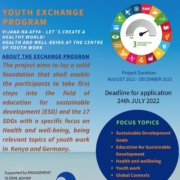By Lorraine Dixon
World Environment Day is the biggest annual event for positive environmental action and takes place every 5thof June. The theme for this year is “AirPollution“.
What is Air Pollution?
Air pollution occurs when gases, dust particles, fumes (or smoke) or odour are introduced into the atmosphere in a way that makes it harmful to humans, animals and plant.This is because the air becomes dirty (contaminated or unclean).
Where does it come from?
Air pollution can result from both human and natural actions. Natural events that pollute the air include forest fires, volcanic eruptions, wind erosion, pollen dispersal, evaporation of organic compounds and natural radioactivity. Human actions that pollute the air include Household combustion devices like jikos (cook stoves), motor vehicles, industrial facilities and forest fires are common sources of air pollution.
What are the Effects of Air Pollution?
The 2017 Kenya Economic Survey estimated that 19.9 million Kenyans suffer from respiratory ailments that are made worse by poor air quality. Over 5 million Kenyans living in major cities and towns are directly exposed to toxic emissions mainly from motor vehicles, industries, use of traditional fuels and kerosene used for cooking and heating. Indiscriminate burning of solid waste also causes air pollution. Air pollution causes death and increased illnesses such as respiratory ailments, heart conditions, brain damage and cancers. It is estimated that 14,300 Kenyans die annually due to conditions attributed to air pollution (Ministry of Environment, 2018). Pollution also affects plants and agricultural yields.
What is Kenya doing about it?
Kenya gazetted Air Quality Regulations in 2014 that specify air quality standards, as well as steps to be taken for “prevention, control and abatement” of air pollution in recognition of the terrible toll it takes on the health of Kenyans’ health.. However, there have been challenges with enforcing the regulations due to a lack of high-quality air quality monitoring data.
What can I do about it?
- Conserve energy – remember to turn off lights, computers, and electric appliances when not in use
- Use energy efficient light bulbsand appliancessuch as energy saving jikos
- Limit driving by carpooling, using public transportation, biking and walkingwhenever possible
- Compost organic food items and recycle non-organic trash
- Choose environmentally friendly cleaners
- Use water-based or solvent free paints whenever possible and buy products that say “low VOC”
- Seal containers of household cleaners, workshop chemicals and solvents, and garden chemicals to prevent volatile organic compounds from evaporating into the air
The focus of this year’s World Environment Day is to urge governments, industry, communities, and individuals to come together to explore renewable energy and green technologies, and improve air quality in cities and regions across the world.
Join the campaign and help us create more awareness by participating in the #BeatAirPollution challenge. For more information please visit https://www.worldenvironmentday.global/get-involved/world-environment-day-mask-challenge



 KOEE
KOEE 


Leave a Reply
Want to join the discussion?Feel free to contribute!